Now that you have applied the texture to the airplane model, you need to use the Unwrap UVW modifier to assign portions of the texture to specific faces.
 open p47_texture_applied_unadjusted.max.
open p47_texture_applied_unadjusted.max.
 click the P-47 object to select it.
click the P-47 object to select it.
Apply the Unwrap UVW modifier:
 Modify panel. Open the Modifier List drop-down list, and choose Unwrap UVW. (You can press U to quickly choose this modifier.)
Modify panel. Open the Modifier List drop-down list, and choose Unwrap UVW. (You can press U to quickly choose this modifier.)
 plus-sign icon to open the Unwrap UVW hierarchy.
plus-sign icon to open the Unwrap UVW hierarchy. 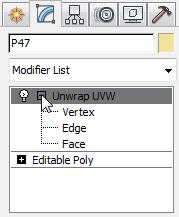
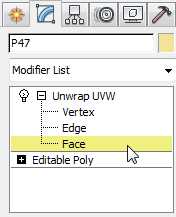
Set up the top of the left wing for mapping:
 (Maximize Viewport Toggle) to make all four viewports visible.
(Maximize Viewport Toggle) to make all four viewports visible.
 (Zoom Extents All Selected) so you can see the whole airplane in the Top, Front, and Left viewports.
(Zoom Extents All Selected) so you can see the whole airplane in the Top, Front, and Left viewports. 
 Crossing state, then in the Top viewport,
Crossing state, then in the Top viewport,  drag a selection box to select all the faces on the top of the left wing.
drag a selection box to select all the faces on the top of the left wing. 
In the Left viewport, Ctrl+click to select the narrow faces along the leading edge of the wing, as well.
 maximize the Left viewport (press Alt+W).
maximize the Left viewport (press Alt+W).
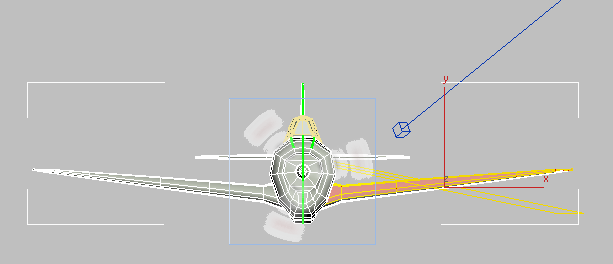

Naming your sub-object selections as you go along can help you select these faces again, if you want to make further adjustments later on.
Set up the UVW Map modifier and the Edit UVWs dialog:
 (Planar Map) to activate it.
(Planar Map) to activate it. 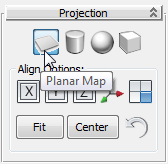
3ds Max applies a planar projection of the texture to the upper surface of the wing, but it still is not the correct mapping.
 (Quick Planar Map) tool on the Edit UVs rollout is an alternative to Planar Map, but it relies on a gizmo, so its result
is not necessarily perpendicular to one of the construction planes. Because of that, we don’t use this option in this tutorial.
(Quick Planar Map) tool on the Edit UVs rollout is an alternative to Planar Map, but it relies on a gizmo, so its result
is not necessarily perpendicular to one of the construction planes. Because of that, we don’t use this option in this tutorial.


 (Align To Z) to make sure the pattern is aligned with the world Z axis.
(Align To Z) to make sure the pattern is aligned with the world Z axis. 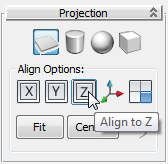
The layout of the pattern changes, but it still needs further adjusting.
 (Planar Map) again to deactivate it.
(Planar Map) again to deactivate it.
The texture projection remains the same, because you have not chosen another method.

3ds Max opens the Edit UVWs dialog.


In the main window, the dialog now displays p47_tex.jpg as a background.

 (Display Only Selected Faces) to turn it on.
(Display Only Selected Faces) to turn it on. 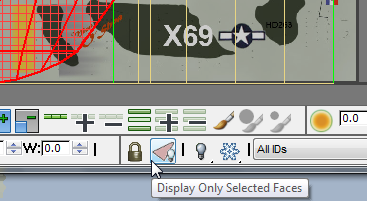
This hides the unselected geometry in the main Edit UVWS window, making it easier to adjust the mapping of the wing.
 main toolbar (at the top), click
main toolbar (at the top), click  (Freeform Mode) to make this tool active.
(Freeform Mode) to make this tool active. 
In Freeform Mode, the sub-object selection is surrounded by a box. Dragging the center of the box moves the selection; dragging a handle in the middle of a side rotates it; and dragging a handle at a corner scales the selection, relative to the texture you are mapping.

Freeform Mode: Moving a selection

Freeform Mode: Rotating a selection
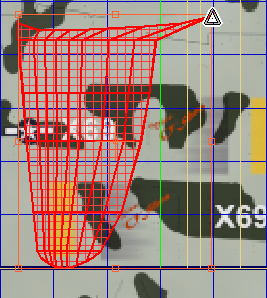
Freeform Mode: Scaling a selection
Now you are ready to position the wing faces over the correct portion of the texture map.


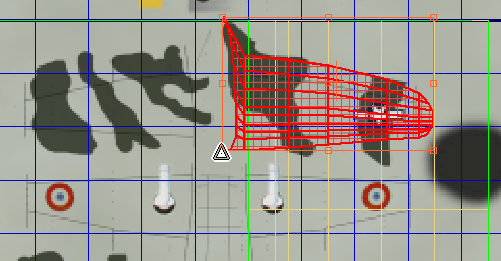
Fortunately, with the camouflage pattern the placement of the wing faces doesn’t have to be precise, but do make sure that the trailing edge of the wing is close to the top of the dark-green swatch that underlies the insignia on top of the wing.
In the Camera01 viewport, you can see that the top of the left wing is now textured correctly.
